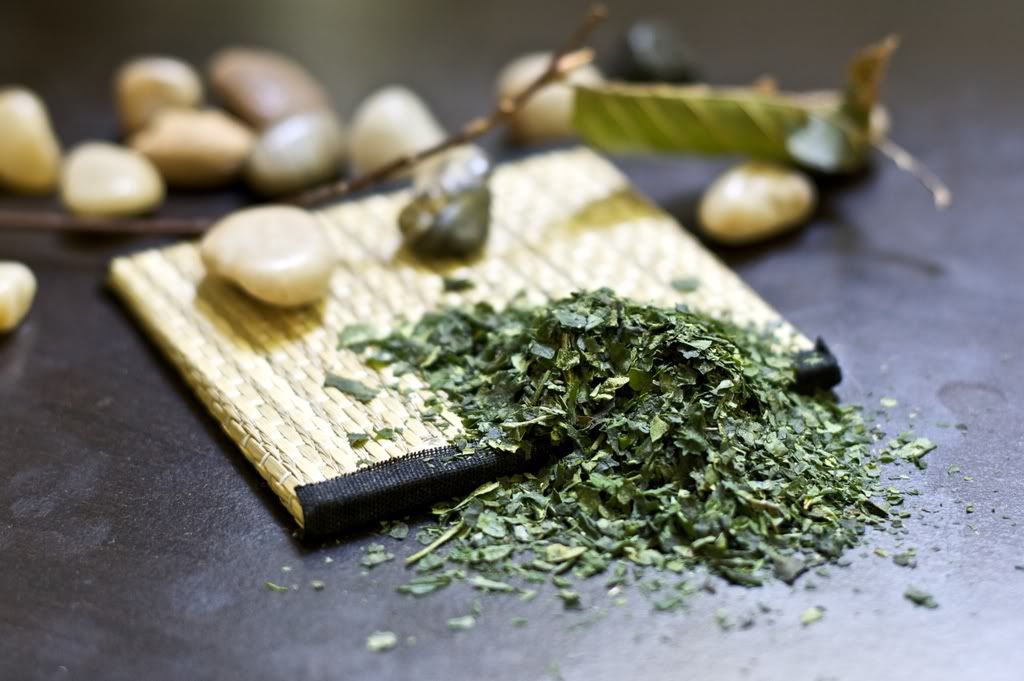Origin: Uji, Japan
Year: 2008
Vendor: Harney & Sons (Product page)
Price: $47.50 (100 g)
I'm not going to lie; I have been eyeing this tea since week one of my loose-leaf tea journey. My tastes may have changed since then, but it was a great pleasure to finally try this tea, courtesy of fellow TeaChatter Pentox (A.K.A. fellow blogger Eric). Thanks for the oppportunity, Eric!

Tencha is a fairly rare tea to come across (Harney & Sons say this as well, but very rarely is a vendor's claim of rarity true), as it is not produced as an end product. Rather, tencha is an intermediate step in the production of matcha. While some shade-grown tea leaf is being rolled and processed into gyokuro, the rest has its stems and veins removed, resulting in tencha, and is finally ground into matcha.
I suppose, then, it is not all too surprising that this tea smells and tastes a bit like a cross between gyokuro and matcha. The dry leaf smells mostly like gyokuro, but is not nearly as vegetal. The first few steeps were much like gyokuro, but the fourth tasted exactly like matcha, just with all the bits filtered out.

As far as parameters go, I brewed this for minute-long infusions until that wasn't enough, at which point I doubled it. I used 5g of tea in around 5oz of water. I tried 150°F first, but that was too high and resulted in that nasty, overbrewed gyokuro taste. 135°F was the sweet spot for me, giving a lovely, sweet, candy-like liquor. And this is coming from a guy who really doesn't like gyokuro.
Another note: it's fairly obvious, once you try to brew it, why this is not intended to be a final product. It is a huge pain in the ass to submerge all those light n' fluffy leaves; I resorted to prodding and stirring them with the end of my thermometer, which couldn't have helped the taste. Quoting Salsero once again, "It makes me feel like I am drowning a puppy, ‘cause it just won’t go under by itself." [Try blaming that one on someone else. ;)]

Anyway, I'm just rambling now, so let me conclude. This was a very interesting tea, and tasting it helps one understand the connection between gyokuro and matcha. It tastes quite good too, but I'm not sure it tastes good enough compared to a quality sencha or gyokuro to make me want to buy a huge tin all for myself. Thanks so much for the sample, Eric!
Eric's notes on this tea can be found here.


I just want to let the world know that I imagine it's like drowning a puppy, since I have not so far actually attempted to drown one.
ReplyDeleteThanks for the nice post and as always amazing photos.
Thanks for the comment, Salsero, I hope I haven't smeared your fake name too much. :)
ReplyDeleteBrent
You'd have to make an enormous effort to besmirch my fake name more than I have already!
ReplyDeleteActually, I was pleased as punch to see you quote my brackish humor. I wasn't sure anyone had even noticed it.
Totally surprised to see how much I agree with you on this one (100%).
ReplyDeleteI've never even heard of this tea, but I'll be sure to keep an eye out for it now.
ReplyDeleteWes,
ReplyDeleteThat surprises me too! :)
Stephen,
Keep an eye out for your wallet too. I would only try it if you could find a sample somewhere; this stuff is expensive!
Thanks to you both for the comments,
Brent
Hi all,
ReplyDeleteAnybody had any experience grounding tea into matcha? I just bought a stone mill wanting to do just that. However, I am stuck into having to buy expensive Tencha to do this.
I wonder though, would Sencha and even Gyokuro do the trick or would they be too bitter on the palate?
Thanks.
I haven't tried grinding my own, sounds interesting though. You could try grinding up some sencha and gyokuro, but my guess is they would be pretty rough. Maybe try separating out the stems and veins from the gyokuro? It sounds pretty labor intensive, but it might work.
ReplyDeleteBrent